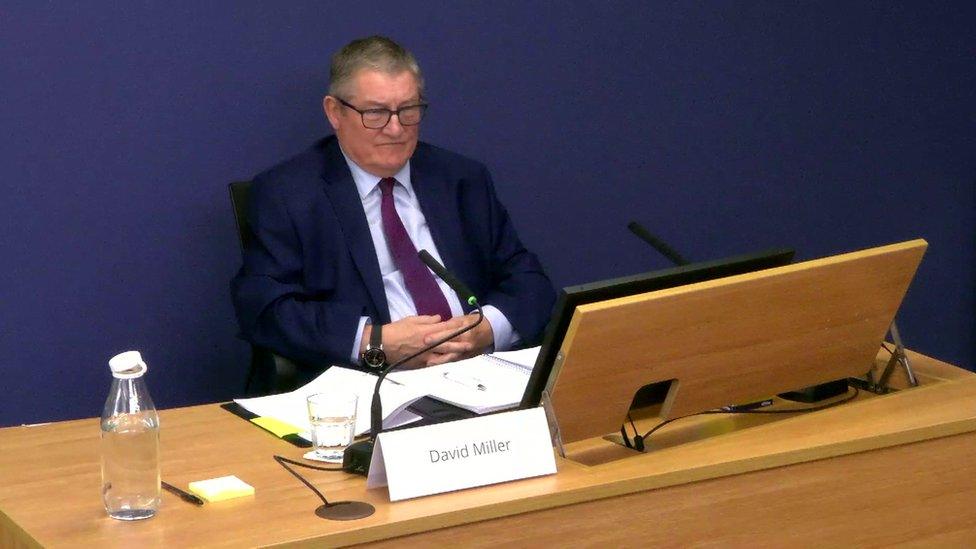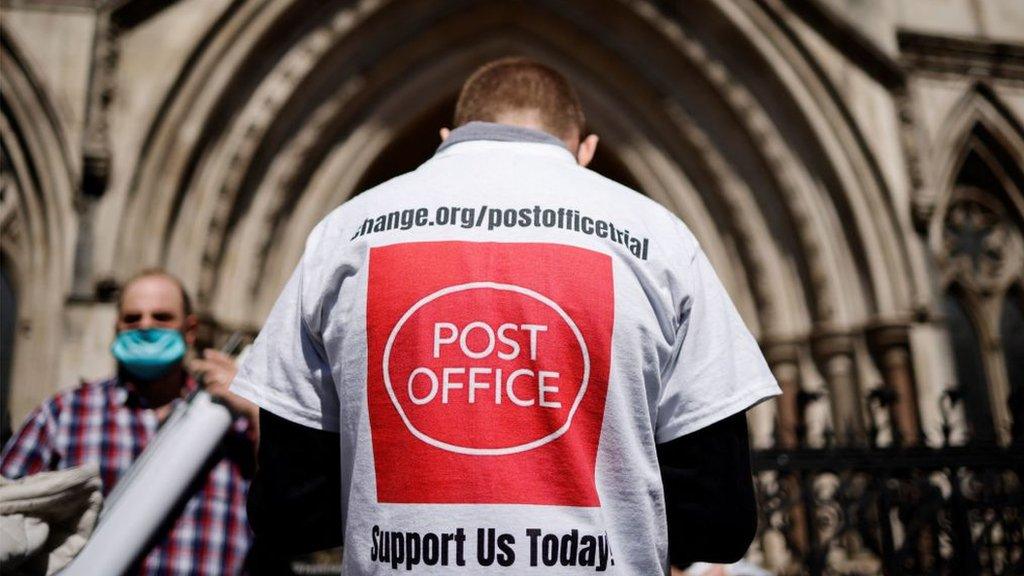Ex-Post Office boss regrets 'missed opportunity' to halt Horizon scandal
- Published

David Miller eventually became chief operating officer at the Post Office
A former Post Office executive has said he regrets a "missed opportunity" to halt the Horizon scandal in 2004.
David Miller, a former Post Office chief operations officer, told the public inquiry into the Horizon scandal he regretted not reading a report compiled by an IT expert.
The report found the IT system was "clearly defective".
Mr Miller said had he read the report, he could have "taken action to address the issues raised".
"Knowing what I now know about Horizon and the way it was used to wrongly prosecute and bring civil claims against sub-postmasters, I very much regret not reading the expert's report and counsel's advice," he told the inquiry.
"Had I done so I would have taken action to address the issues raised. I acknowledge that by not reading them there was a missed opportunity," the former Post Office executive added.
But during heated exchanges, Sam Stein, a lawyer representing some of the victims of the scandal, said Mr Miller was "either lying" about not having read the report, or "a complete incompetent".
Mr Miller responded: "I'm not lying through my teeth."
Mr Stein continued: "Right, so incompetence?"
Mr Miller said: "If you wish to say that, yes."
Mr Stein then asked: "Well do you agree it's incompetence not to have read a report in these circumstances?"
Mr Miller replied: "I'm not happy that I didn't read that report."
The report in question was written by IT consultant Jason Coyne who was commissioned by the Post Office as an expert witness for a civil case that the Post Office brought against sub-postmistress Julie Wolstenholme, who ran a branch in Cleveleys, Lancashire.
The Post Office pursued her for £25,000 and as part of the case, instructed Mr Coyne to assess whether she was responsible for the losses.
When he flagged discrepancies in the software, he was "effectively sacked" and the Post Office "attempted to discredit the report internally", according to Mr Coyne.
The Post Office eventually settled the case.
Mr Miller added that had Ms Wolstenholme won a tribunal appeal against the Post Office in 2002 for unfair dismissal it would have been a "significant challenge to the business model" of the Post Office.
A Post Office "IT risk register" suggested it could suffer £1m of financial and reputational damage if it lost the case against Ms Wolstenholme, relating to reliability of Horizon accounting data.
Later, the inquiry heard from former chief executive David Mills, who said he did not look any closer at the report.
"I hadn't properly assimilated the fact that the reliability of Horizon was in mind. What was in my mind was £1m," he said.
"If I had concentrated on any issue at that level, I'd have never gotten anywhere near to turning the Post Office [finances] around," he added.
"Fit for purpose"
Mr Miller, who prior to promotion was in charge of getting the Horizon system up and running, earlier told the inquiry he should not have told the Post Office board the system was "robust" in 1999.
He was recorded as saying the system was "fit for purpose" at a board meeting in July 1999 after testing.
However, Mr Miller admitted he was aware that sub-postmasters were having problems with it a month before.
For more than 15 years from 1999, the Post Office insisted Horizon was robust when prosecuting sub-postmasters.
But many were having difficulty balancing accounts during a live trial of the system in May 1999.
Mr Miller was also aware of other problems with the system that had occurred during testing that March.
And in August of that year, auditors EY flagged concerns with "accounting integrity issues" during a live trial of Horizon to Mr Miller.
He had previously told an inquiry into the Horizon scandal that he would not have told the board in 1999 that the system was robust.
But giving fresh evidence to the inquiry on Tuesday, he said that although he did not recall telling the board that, if it was noted in the minutes then he must have done.
"I should not have said that it was robust," he said.
However, he said he had believed there were processes in place to improve the system after feedback from sub-postmasters.
Mr Miller was in charge of putting the Horizon system in place from 1998 until early 2000. After that, he rose up the ranks to become chief operations officer.
Mr Miller also said he regretted not letting the head of the Post Office investigations team, Tony Marsh, and group lawyers know about problems with inaccuracies in the system which were still being addressed in early 2000.
"On reflection, and I have reflected on this very hard, when I finished being the Horizon programme director [in early 2000] it would have been very beneficial if I had notified both the lawyers and the [investigations team] that Horizon was a new system coming in, and that they should be very cautious about evidence coming out of that system," he said.
Between 1999 and 2015, the Post Office prosecuted more than 700 sub-postmasters using faulty data from the Horizon system, and more than 900 were prosecuted over all.
Mr Miller said that he had been aware since 1970 that the Post Office performed its own investigations and prosecutions.
He said he now recognised that there was a problem in the Post Office being the alleged victim of financial crime by sub-postmasters, as well as the investigator of those alleged crimes, and the prosecutor - although he did not think there was a conflict of interest at the time.
Related topics
- Published13 March 2024

- Published2 February 2024

